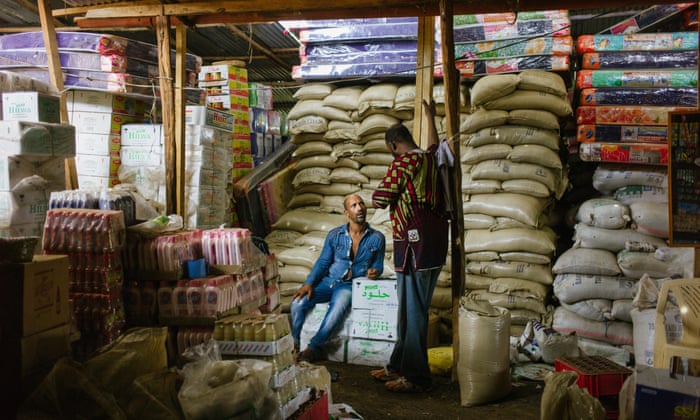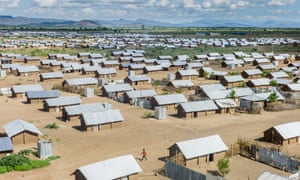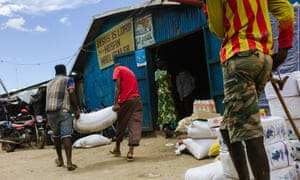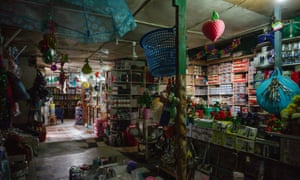It’s a sweltering afternoon in the Kakuma refugee camp, and workers are busy loading crates of Coca-Cola bottles into a run-down car stationed in front of Mesfin Getahun’s store. Clad in a pair of denim jeans and a matching shirt, the 42-year-old Ethiopian wholesaler moves swiftly inside the large room filled with piles of bulk powder milk, canned tomatoes and sacks of grain, attending to customers’ requests and giving orders to staff. A small crowd of refugees and members of the local Turkana tribe have gathered to socialise, sitting on plastic chairs by the shop’s entrance.

In 2001, Getahun fled neighbouring Ethiopia amidst political turmoil, settling in this sprawling camp located in arid, isolated and underdeveloped Turkana County, in north-eastern Kenya. Nobody, including himself, would have predicted that in 16 years he would go from sweeping floors to make ends meet, to being one of the camp’s premier wholesalers whose $10,000 (£7,779) monthly income has earned him the nickname “the millionaire.”
But today he’s troubled. His family have been selected for resettlement to the United States and is waiting for a departure date. It’s an offer most refugees would only dream of receiving, but it has led to an unexpected set of challenges for Getahun, whose refugee status makes it difficult for him to collect his assets, scattered between the local bank and the camp in investments and in cash, and transfer them abroad. Finding someone capable of buying and taking over his operations would also take time, he explains.
Like many refugees, Getahun arrived in Kenya with nothing – so it would be a big deal for him to sell up and start over again. But staying in Kakuma does not guarantee him security either as the Kenyan government has repeatedly claimed it wants to close all the country’s refugee camps over security fears. Attempts by the government to close the world’s biggest refugee camp Dadaab were halted by a court order earlier this year but the future of the camps is still uncertain – and with it, Getahun’s entire customer base.
“The Kenyan government has said they didn’t want to have refugees here, so I’m at risk even now. I must protect my money, but I don’t have any insurance. You have to be tactful when you live here as a refugee. I have a good relationship with the local people, the Turkanas [but I am still nervous about the government changing its refugee policy].”
A refugee’s rise to the top
A former soldier, Getahun’s first job at the refugee camp was as a cleaner at a refugee-run coffeehouse, where he earnt 1000 Kenyan shillings (£7.50) a month.
“I just kept that money. Then I used the savings to bake bread. I brought a little bit of wheat flour, and I started selling bread.” He ran his bakery business for a few years, before deciding to open a shop, selling a wider range of goods at a small profit.

But with close to 200,000 people living in the Kakuma camp, which opened in 1992, Getahun sensed there was a bigger business opportunity to be had. The residents there rely on refugee-run businesses to access goods and services that are not provided by international aid – think canned food, shampoo, school supplies, clothing, cybercafés, kitchenware, beauty products, restaurants, bars, photography studios and much more. Residents trade their food rations on the black market to pay for these goods, use money sent from relatives abroad, or start their own business (or look for a job in one of them). The luckiest ones are employed by one of the national and international aid agencies operating in the camp, for much higher wages.
Kenyans also shop, trade and sometimes work in the camp, attracted by its low retail prices and business opportunities.
The sheer scale of the camp and its needs was why Getahun didn’t fear competition. Instead he set up a wholesale business, knowing its success would rely on the expansion of the refugee-run economy.
“Most of the shopkeepers here, they are selling second-hand clothes. Only me, I was selling different things, different items,” he recounts. “So I just tried to teach them: ‘Why don’t you sell like me?’”
He not only encouraged them, but also mentored them and invested in their enterprises, thereby creating a network of businesses that ended up catalysing his transition to wholesale.
Rahul Oka, an anthropology professor at the University of Notre Dame who has studied Kakuma’s economy for years, says Getahun’s rise to the top of the camp’s economic ladder is unexpected. “Mesfin is unique,” he says.
Kakuma’s economy is run in large part by refugees who were already doing business back home, and brought along with them contacts and sources of informal capital. Somalis, for instance, can rely on a centuries-old money transfer system called hawala, remittances from family abroad, and business ties across East Africa and the Middle East.
For a refugee to compete with these well-established traders without any business experience, savings or access to credit, goes against all odds, Oka explains. “He’s actually replicated the Somali, or the Gujarati, or the Lebanese family business model, except that it’s not kin-related, but the ties are based on friendship and reciprocity.”
A fervent Christian, Getahun claims his innate business acumen is a “gift of God,” which he must repay through charitable actions. He’s helped build churches in the camp, and has made donations to mosques as well. He occasionally pays for hospital bills, supports the private education of orphaned children, and gives food to those in need. “I just follow the instructions of God,” he explains. “I don’t want to see poor people so I help them.”
In business and philanthropy, Getahun has cut across ethnic lines inside and outside the camp. He employs, does business with and gives to members of the local Turkana tribe, who often live in deep poverty. “He’s essentially generated tremendous amounts of social and political capital by his general goodwill,” explains Oka. “That has also played into an increase in his financial capital, because people go to him specifically to buy.”
“The millionaire” meanwhile lives modestly with his wife and two children in a large room located at the back of his wholesale warehouse. He doesn’t like to go out, or to go to restaurants. “I just spend my time here at work. I don’t want to go anywhere.”
His imminent resettlement to the US weighs heavy on his mind though. He has pleaded his case to the staff from the International Organization for Migration and the American embassy in Kenya who handle his file, but says he’s received little help to sort out the logistics of his departure. “They don’t understand me,” he laments.
The humanitarian system likely didn’t foresee that a refugee would start his life over and build a business empire in a camp where most live with their life on hold.
Join our community of development professionals and humanitarians. Follow @GuardianGDP on Twitter.
Since you’re here …
… we’ve got a small favour to ask. More people are reading the Guardian than ever, but far fewer are paying for it. Advertising revenues across the media are falling fast. And unlike many news organisations, we haven’t put up a paywall – we want to keep our journalism as open as we can. So you can see why we need to ask for your help. The Guardian’s independent, investigative journalism takes a lot of time, money and hard work to produce. But we do it because we believe our perspective matters – because it might well be your perspective, too.
If everyone who reads our reporting, who likes it, helps to support it, our future would be much more secure. Read more here



